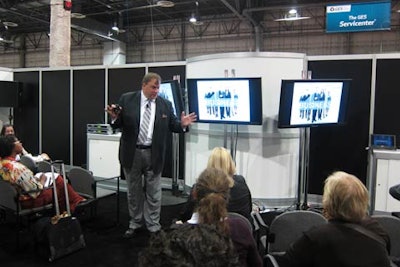
Revent L.L.C.'s Roger Rickard started his session at IMEX America on Wednesday thusly: “If you have your phones on, keep them on. If you get a call for business, great, do business.” The message was that meetings—like the giant meeting industry powwow at the Sands Expo in Las Vegas, where Rickard was speaking—are important economic engines with essential value.
"We all know that we had a perfect storm two years ago. Yes, there was a recession, yes, things hit our industry. But for the first time, government attacked us. We were told, 'Don’t go to Las Vegas, meetings are boondoggles,'" he said. "We were not prepared at that time to stand up and protect ourselves. Not shame on them, but shame on us for not being able to do that." In a session on advocating for the meetings industry, he explained that now there are better tools that can be used—and must be used—by the industry to justify its economic significance.
Here are the headlines relevant to the discussion. First, attendance levels are increasing overall. "You can see that by the action here at IMEX," Rickard said. Further, spending per meeting is continuing to grow (but so are other things, like cost of transportation). The greatest increases are coming from corporate and association marketplaces and the greatest decline is in government. Business conditions for meetings continue to improve worldwide. And people have fear of the impact from rising fuel prices (resulting, for instance, in decisions being made in a shorter window).
So how do industry professionals measure meetings so they can be a voice to advocate for them? The facts show that the industry is responsible for 1.7 million direct jobs, a figure derived from a study conducted by PricewaterhouseCoopers on behalf of the Convention Industry Council with an array of industry partner organizations in 2009, when the industry was down. An additional 4.6 million indirect and induced jobs come from meetings. "So really, that's 6.3 million jobs affected by the meetings industry—and that’s in a bad year," Rickard said. According to the United Nations World Tourism Organization's definition of a meeting, there were 1.8 million of them in all—meaning one direct job associated with every one meeting, and three indirect jobs associated with each.
To put it in perspective, those figures put the industry at about 26 percent larger than the U.S. auto manufacturing industry, accountable for $263 billion in direct spending and $907 billion in total economic impact, even in the bleakness of 2009. Further, meeting industry taxes bring in $110 billion annually to government coffers. "It’s always about the money," Rickard said, when it comes to advocating for the industry's value.
Additionally, meetings contribute to the successes of other businesses, because people are in the town spending money; for that reason, meetings are important to local communities. And meetings help create brands for global destinations.
"As individuals, we must be willing to speak out, and we must demand of our industry leadership that they be willing to speak out," Rickard said. "When they start talking about muffins and boondoggles, we will be prepared with the talking points. Meetings, events, incentives are an economic engine. It creates money. Hello. We do that.”



















